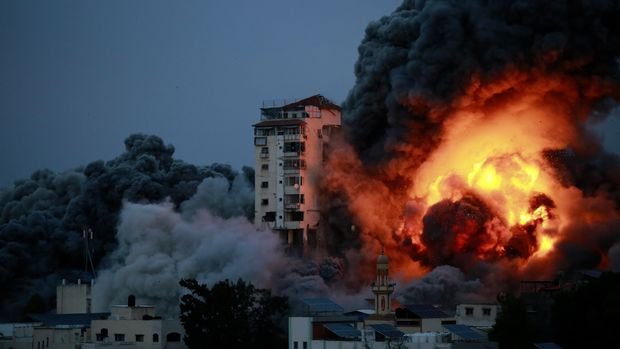|
Listen to article
Getting your Trinity Audio player ready...
|

It has been more than two months that Israel has been waging war against Hamas to weed out that organisation. Hamas committed a heinous massacre of innocent civilians who were attending a rave party and trance music festival just a few miles from the border with Gaza. Hamas killed more than 1,300 people (including off-duty or unarmed soldiers) before the Israel Defence Forces (IDF) belatedly swung into action. Israel underestimated Hamas, which it initially helped build up and fund, and had not prepared for a ground raid on that scale despite several warnings being given by the country’s own Intelligence services.
Israel has an Iron Dome air defence system to intercept incoming rockets but Hamas still managed to carry out a large-scale combined attack. As a result, Israel has retaliated with ferocity, trying to crush Hamas whose fighters had made and streamed online live videos of their killings. Such crimes are not compatible with their claims of being bonafide freedom fighters. Yet, the Left liberals in the world only condemn Israel’s brutal retaliation and accuse the IDF of taking disproportionate action by bombing hundreds of civilian targets and indiscriminately killing tens of thousands of people. The war, they say, is asymmetric and amounts to an unwarranted full-scale military assault on semi-state actors (i.e., Hamas) and a mostly defenceless civilian population; yet, what Hamas did on October the 7th, 2023 against Israeli civilians was a crime against humanity, even though the United Nations has repeatedly condemned Israel for illegal territorial occupation, land grabs and expulsion of local inhabitants from their homes and lands without regard for international law.
To disarm Hamas, to protect its citizens and territory and to fight terrorism, Israel was entitled to act in self-defence. Hamas’s terror attack was intended to destroy all chances for peace, however slim those may be, given the intransigence on both sides of the conflict. This latest Hamas blitz thwarted a gradual process of normalisation (The Abraham Accords) signed between Israel and the United Arab Emirates, Bahrain, Morocco, and Sudan for making peace in West Asia, based on mutual understanding and cooperative coexistence.
Hamas expected and counted on an extremely violent forceful Israeli response. Israel is trying to make it clear that its war is not against innocent Palestinian people and that the IDF’s aim is not to kill civilians. However, Hamas has been using civilians as human shields and that policy is contributing to a massacre in Gaza. Like many other paramilitary fighting groups (and even regular troops, like the Ukrainian forces) the Hamas militias hide many of their men and weapons in civilian buildings such as hospitals and schools. Though the humanitarian crisis in Gaza demands a meaningful solution, the Hamas tactics have made it difficult for the IDF to defeat the much smaller and less well-armed Gaza fighters.
Egypt is very close to the Gaza border. The country should be taking Palestinian refugees for the time being, till the war ends but is not willing to do so. Going back in history, Israel gave many chances for near autonomy to be achieved by Palestinians, even though it has not given true scope for the two-nation proposal to be implemented. All along, Hamas as well as the Palestine Liberation Organisation (PLO) have proven to be corrupt and have not served the best interests of Palestinians.
On November 29, 1947, the UN General Assembly adopted a Resolution, advocating a two-state solution for Palestine. India also voted for it. The Oslo Accords in the 1990s aimed at a two-state solution but were set back by the assassination of Israeli Prime Minister Yitzhak Rabin and the death of President Yasser Arafat. At present, the U.S. and India’s views converge on the general issue of Israel vs, Palestine. The former Indian diplomat KC Singh writes that in the recently held fifth 2+2 ministerial dialogue between India and the United States. convened in New Delhi on Friday, November 10, according to the joint statement both countries condemned the terror attack by Hamas on October 7. India broadly accepts the US language in support of Israel’s right to self-defence, the need to release hostages, the observance of international humanitarian law, and the protection of civilians. Singh added that India did not insist on a ceasefire.
The Indian reiteration of a two-nation solution has been dropped in favour of a “political solution and durable peace” but the United States alone vetoed the nearly universal call for an immediate ceasefire at the UN. Whether this war escalates and spreads to the wider region is still a question. How could Israel withdraw as long as there is no Hamas surrender and release of its hostages? In this tragedy, the U.N. has shown its impotence once again. That the U.N. is not calling Hamas a terror organisation is condemnable since it is a radical and violent anti-zionist faction. In many Western countries, there are huge pro-Palestinian rallies. The Leftist liberals and various minorities generally organise them. States that champion freedom of speech, are now struggling to control these rallies that go against their policies. Suella Braverman, the British home secretary lost her portfolio for preventing one such rally, as the police refused to ban it. In the West too, freedom of speech is increasingly contested from all sides.
Those who are outside the war zone and see only the painful images should keep in mind both sides of stories and not pick one side while ignoring the other’s predicament. There is no doubt that this war has polarised the entire world.






Add comment